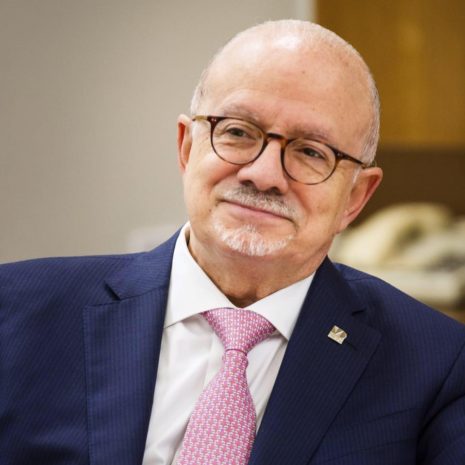University President Once Fled the Communists — Now He Presides Over a Diverse Group of Promising Students
Date: June 27, 2016

As President of Miami Dade College, Eduardo Padrón presides over 170,000 students, most of whom are immigrants or the children of immigrants, Graduates include mayors, lawyers, police and fire chiefs, and prominent political figures such as U.S. Rep. Ileana Ros-Lehtinen, R-Fla., the first Cuban-American ever elected to Congress. “From the very beginning, in 1960, this college has nurtured itself with immigrants,” Padrón says. “It’s played a major role as an equalizer in the Miami community by providing people with the most important thing that you can give to an immigrant: Education. Miami would not be what it is today without Miami Dade College.”
Yet Padrón never planned to be an academic. “My ideal American dream was to make a lot of money,” he recalls with a chuckle. “That never happened because I fell in love with teaching. It became my religion and my calling. I became very passionate about it, and I’ve been in education now for well over 40 years.” Padrón has been called one of “The 10 Best College Presidents” by Time magazine, pronounced one of the eight most influential college presidents in the U.S. by the Washington Post, and has racked up a slew of international awards for his diverse community and public service activities, including serving on the board of the U.S. Council on Foreign Relations.
At 16, Padrón came to America from Cuba with his 13-year-old brother. “The situation there was very bad politically,” he says. “The Communist regime had taken over. They had threatened to take all the children under 17 or 18 to government quarters and indoctrinate them and educate them their way. My parents were very afraid of that. So they found a way of getting us to Miami.” The first days and months were difficult. The young brothers had no place to live, no money, and a feeble understanding of American culture. They also didn’t speak English.
I believe that immigration plays a very, very important role in bringing new energy and new talent and hope.
Padrón’s parents joined the boys four years later, but they didn’t stay long; they relocated to Colombia after Padrón’s father accepted a position with a new company. Padrón’s brother went with them, leaving Padrón alone in his adopted country. “I was fortunate to have had a great upbringing from my parents, who instilled in me important values,” he says. “There’s no substitute for that. I stayed here after they left with my brother, and continued going to school.” He finished high school and college, and went on to earn a doctorate in economics from the University of Florida.
Miami Dade College, where Padrón has been president since 1995, serves students from more than 150 countries. It’s just one example of the irreplaceable force immigration plays in the development of American society, Padrón says. “I believe that immigration plays a very, very important role in bringing new energy and new talent and hope. The impact of this college in this community is unmatched.” He points to the contributions graduates have made locally: They are architects who have built some of Miami’s most noteworthy buildings, doctors, hospital directors, corporate leaders, and lawyers.
“Anyone who knows anything about the history of this nation knows that from the very, very beginnings this country has been built by immigrants,” he says. “I think that the system needs to be more conducive toward allowing immigrants to be full contributors to the economic growth of our nation. This is not rocket science. The answer with that is with Congress, but paralysis exists there today. But I still remain hopeful that comprehensive immigration reform will happen.”
